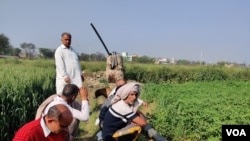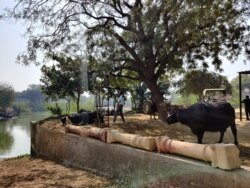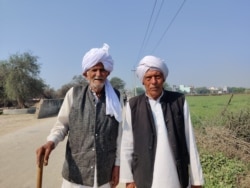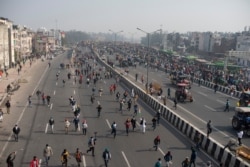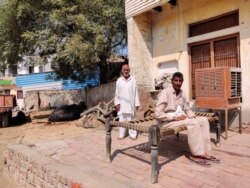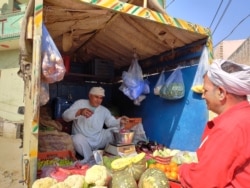Ram Phal grew up watching his village in north India transform as high yielding varieties of wheat and rice brought bumper harvests and prosperity to the countryside. It was called India’s “Green Revolution.”
But times have changed, said the 63-year-old farmer as he walked through his field where the tall stalks of wheat are ripening. “Over the last 10-20 years, our profits have been dwindling,” mused Phal. “That is because the cost of farm inputs has increased, whether it is diesel, fertilizer or seeds. Crop prices however have not kept pace.”
Farmers in Daryapur village in Haryana state outline many other problems. After decades of growing high yielding crop varieties, soil nutrition and water tables have depleted resulting in more reliance on irrigation and fertilizers. Crop yields are more uncertain as farmers grapple with the growing frequency of extreme weather events that ruin crops. Farmers point to a field where the mustard crop wilted after a spell of unusually bitter cold this winter.
The three new agriculture laws against which tens of thousands of farmers in the north have been protesting for more than three months draw sustenance from villages like Daryapur, which see them as a threat to already precarious incomes.
“Earlier we could make about $ 300 to 400. Now because of rising costs that has reduced,” said 19-year-old Manoj Gulia, who helps till his family plot but is disillusioned with farming. “That is why young people like me want to leave farming. We slog the whole day and there is such little profit.”
In one of the biggest mobilizations by farmers witnessed in India, growers mostly from Punjab, Haryana and Uttar Pradesh states have been parked in tractor trolleys along highways leading to the Indian capital, Delhi, demanding that the laws must be scrapped.
The government’s offer to put them on hold for up to a year and a half has failed to allay their concern that they will pave the way for corporate control over agriculture and drive down prices of their produce.
The government says the new laws will improve rural incomes by encouraging private investment in the sector and allowing farmers to sell their produce to private companies.
For farmers in Daryapur however, the laws spell more uncertainty at a time when they are already coping with many challenges. At the moment, the wheat and rice crop from villages like this are sold at markets called “mandis” at a price set by the government.
It is not a perfect system, admit the farmers here, because middlemen take away a chunk of the profits.
But they fear being exposed to market forces will worsen their plight. They say the new rules will make it easier for corporations to exploit agricultural workers and drive down prices.
“The farmers here are not so literate that they can negotiate with private players,” according to Gulia. “We feel that in the current system at least we get paid.”
That is the heart of their demand: the government must legalize a decades-old practice in which it offers a minimum price for 23 crops such as rice, wheat and sugarcane. They are not satisfied with verbal assurances by authorities that the system will continue.
“Private companies will not give us a good price unless there is a legal guarantee of minimum price,” pointed out farmer Bhagwan Dahiya.
Through 11 rounds of talks held in recent months, the government has been unable to convince farmers that the reforms will modernize agriculture and bring them benefits. Authorities say they will encourage private investment in the rural sector and spur the growth of agro-industries like food processing around villages and open the door to new employment opportunities. It says the new laws will also help farmers who own small plots of land by giving them the option of farming on contract for corporations.
But the farmers of Daryapur view the laws as an existential threat. Although Dahiya feels the return he gets from faming his two-hectare plot of land is not commensurate with the hard labor he puts in, he said it is the only occupation he knows.
“We have no choice but to farm our lands. I am illiterate. No one will give me a job. How can I change my occupation when I am 45 years old?” said Dahiya.
Farm economist Devender Sharma says what farmers are looking for is an assured income. “It is a legitimate demand. After all the government sets a minimum wage for labor in industry,” he points out. “Then why not a minimum price for crops? They also need a safety net.” He points out that more and more farmers have been driven into debt in recent decades due to dwindling incomes.
Although nearly half of India’s 1.3 people depend on farming, agriculture’s share in its economy has steadily shrunk — in 2019 it accounted for about 18 per cent of the country’s gross domestic product.
Anger is growing in Daryapur as talks between protestors and the government remain deadlocked. Some here have travelled in tractors to the large protest sites around Delhi to join the rallying cry of farmers — scrap the laws. Others walk to a small local site that has sprung up around villages.
And as a group sits under a tree browsing the newspaper for news of the protest, Dahiya reads out an item quoting a farm leader saying it could take years before their demands are met. It only strengthens their resolve to continue with the protest. “However long it takes, we will not give up,” he and the others vow.




